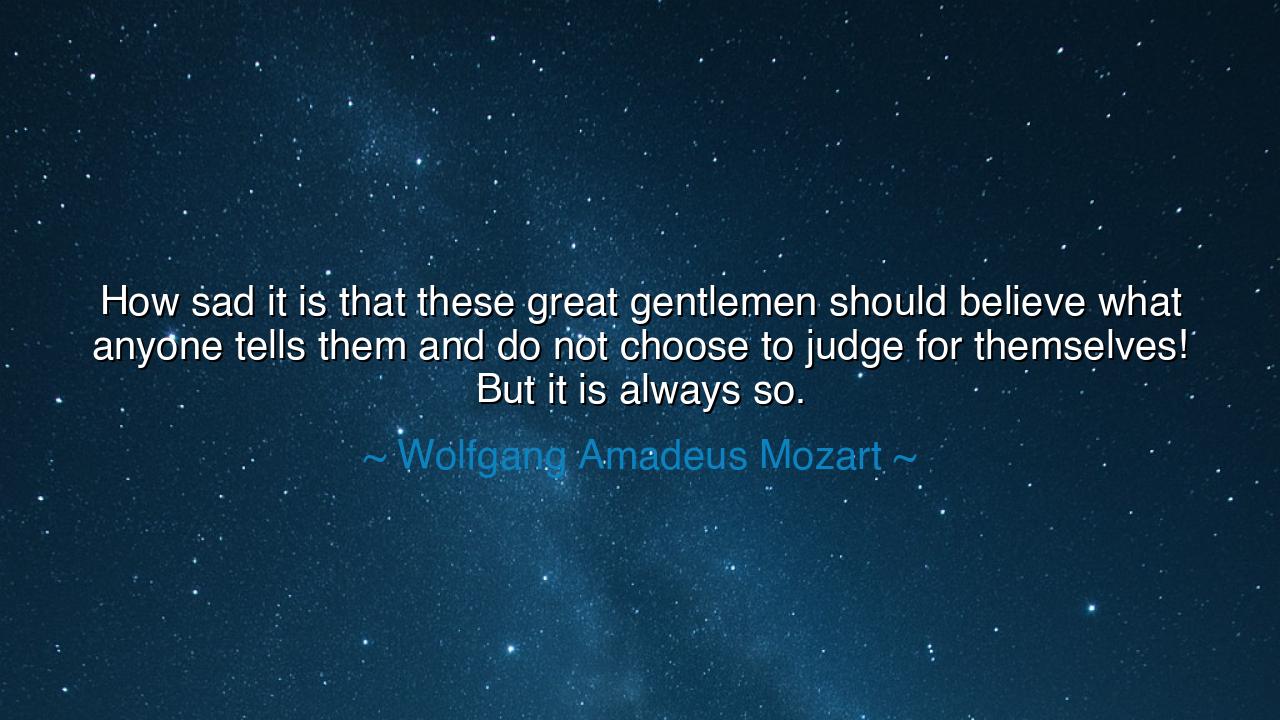
How sad it is that these great gentlemen should believe what
How sad it is that these great gentlemen should believe what anyone tells them and do not choose to judge for themselves! But it is always so.






In the lamenting words of Wolfgang Amadeus Mozart, one of the purest spirits to ever grace the earth with music, there lies a timeless sorrow and a warning: “How sad it is that these great gentlemen should believe what anyone tells them and do not choose to judge for themselves! But it is always so.” This cry of frustration, uttered centuries ago, still echoes through the corridors of time — a reminder that blind acceptance has always been the chain that binds truth, while independent thought is the fire that sets it free. Mozart, the genius whom kings envied and common men adored, spoke these words not merely from pride, but from pain — for he saw how easily the minds of the powerful could be swayed by gossip, envy, and falsehood.
In his lifetime, Mozart faced not only the struggles of artistry but the cruelties of misunderstanding. Born a prodigy, he dazzled the courts of Europe with music that seemed to descend from heaven itself. Yet in the glittering halls of Vienna, among the “great gentlemen” he mentions, he found that genius was not enough to earn respect. His rivals whispered, courtiers flattered, and those in authority — men of status but not of insight — believed every tale they were told. They did not judge for themselves, nor seek truth through discernment. They preferred the ease of opinion over the labor of understanding. And so, Mozart was often dismissed, denied, or misjudged by those unworthy of his art.
Thus his words carry the weight of both personal experience and universal truth. How often has the world been led astray because men in power refused to think for themselves? The ancients spoke often of this weakness. In the courts of Socrates, false witnesses and gullible judges condemned the wisest of men to drink poison, all because they “believed what anyone told them.” And yet, it is not only rulers and philosophers who fall prey to this folly — it is the weakness of all humankind. For to think independently requires courage, while to believe what others say requires only comfort. The path of reason is narrow and steep; the path of rumor is wide and easy.
Consider also the tale of Galileo Galilei, who looked through his telescope and saw the earth was not the center of the universe. The “great gentlemen” of his time — learned scholars and churchmen — refused to look through the same lens. They believed instead what others had long told them: that the heavens revolved around man, not man around the heavens. Their pride and their fear blinded them to truth. And so Galileo was condemned, just as Mozart was dismissed — not by fools, but by educated men who lacked judgment. Here we see the curse that Mozart spoke of: that wisdom, when unaccompanied by the courage to question, turns to folly.
There is in Mozart’s lament a touch of divine melancholy, the kind that comes from a soul too honest for its age. He does not speak with anger but with pity. “But it is always so,” he says — as if recognizing that human nature itself resists truth. Yet within this resignation lies a call to awakening. For if the majority will always believe too easily, then the few must strive all the harder to think freely, to seek truth through reason, observation, and conscience. This is the duty of every generation: to break the spell of hearsay and awaken the mind’s own light.
And so, what lesson should we draw from this? It is this: Do not let your judgment be borrowed. Test every word, even those spoken by the wise. Let not rank or reputation decide what you believe, but reason and truth. In your dealings with others, listen — but verify. Question not out of cynicism, but out of love for understanding. For the world is still full of “great gentlemen” — and ladies, and scholars, and rulers — who believe too easily, who follow the echo instead of the voice, who allow lies to spread because they fear to think alone.
If we would honor Mozart, let us do more than listen to his music — let us listen to his wisdom. Let us strive to be the kind of people who judge for ourselves, who do not surrender our minds to the comfort of conformity. For the freedom of thought is the melody of the soul; it is the harmony by which civilizations rise, and the dissonance by which they fall. And so, as Mozart’s notes still dance across centuries, let his words do the same — reminding us that the greatest tragedy is not ignorance, but the refusal to see.
“How sad it is…”, he said — but perhaps, if we choose to think for ourselves, the next generation need not hear that sadness echoed again.






AAdministratorAdministrator
Welcome, honored guests. Please leave a comment, we will respond soon